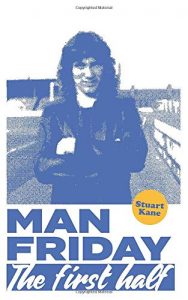 Where to start? Well, the back cover of this book defines itself as “biographical fiction” so a definition of the term is as good a place as any to begin. In essence, biographical fiction is a form of writing which takes a real-life individual and combines actual events in their life with a fictional narrative in which other situations and characters are created to tell the story.
Where to start? Well, the back cover of this book defines itself as “biographical fiction” so a definition of the term is as good a place as any to begin. In essence, biographical fiction is a form of writing which takes a real-life individual and combines actual events in their life with a fictional narrative in which other situations and characters are created to tell the story.
Man Friday: The First Half (The Life and Times of Robin Friday) by Stuart Kane, isn’t the first book in the football arena to use such a form, with David Peace’s excellent The Damned Utd (published 2006) and Red or Dead (published 2013) forerunners. Peace looked at the 44 days that Brian Clough spent at Elland Road in charge of Leeds United at the start of the 1974/75 season, in The Damned Utd, whilst Red or Dead featured the managerial career of Bill Shankly at Liverpool from 1959 to 1974.
Whilst both of Peace’s books looked at managers and life in the then top-flight of English Football – the First Division, Kane turns his attention to a player from the other end of the football spectrum, Robin Friday at Division Four side, Reading.
This first book whilst dominated by Friday’s career at Reading between 1974 and 1976, provides the reader with a very brief introduction to his upbringing, with details of his playing time as a youth at Chelsea, his early drug taking, a spell in borstal and a near fatal accident whilst working asphalting. They are a useful scene setter in understanding the character of Robin Friday and the way he led his life.
Kane provides details of the games that Friday played in at Reading’s old Elm Park ground and provides in each, on the one hand an element of factual content in terms of the score-line and scorers and on the other provides a very real sense of what football was like at this level during the 70s. This was a time when the game was very physical and skilful players such as Friday got little protection from referee’s, and their play was not helped by surfaces that ranged from grassless and bone hard to mud baths. Life in the Fourth Division was unglamorous, as fans and players endured poor facilities and crumbling stadiums, with the threat of hooliganism also a possible part of the matchday experience. Players at that time were a lifetime away from those of today with dietary plans and inventive training, instead this was a period when the drinking culture was the norm.
The book whilst successfully capturing the football landscape of the time, also delivers through Friday, the superstition, repetition and routine of life as a professional player. Where in The Damned Utd, Peace has Brian Clough repeatedly prowling the corridors of Elland Road as he attempts to deal with the reputation of former Manager Don Revie that hangs over Clough and the club, Kane has Friday going through the same match routine prior to the start of the game. Out on the pitch is where Friday can excel and express himself, with his off-field drug taking and drinking providing his escape from the pressures of life, which Kane imparts through the fictionalisation of life away from the pitch.
This is an engaging read and draws you into Friday’s world, leaving the reader eagerly awaiting the second half of the story.
(Helpston Fuller. May 2020. Paperback 326pp)
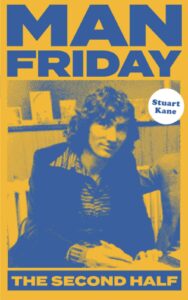 It is July 1976 and Robin Friday is now a Third Division footballer, but he still dreams of reaching the top of his profession.
It is July 1976 and Robin Friday is now a Third Division footballer, but he still dreams of reaching the top of his profession.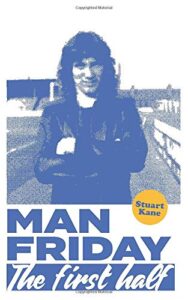 Robin Friday dreams of being a professional footballer: rejection, drugs, borstal, and a near-fatal industrial accident won’t stop him.
Robin Friday dreams of being a professional footballer: rejection, drugs, borstal, and a near-fatal industrial accident won’t stop him.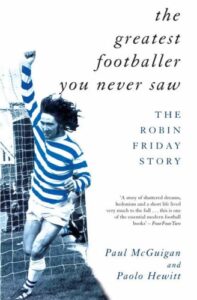 Robin Friday was an exceptional footballer who should have played for England. He never did.
Robin Friday was an exceptional footballer who should have played for England. He never did. This is the second part of Stuart Kane’s work on the ex-Reading and Cardiff City player Robin Friday. The first book was reviewed by FBR back in September 2020 and can be found
This is the second part of Stuart Kane’s work on the ex-Reading and Cardiff City player Robin Friday. The first book was reviewed by FBR back in September 2020 and can be found 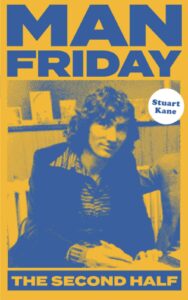 Stylistically the book continues in its biographical fiction form as Kane once more combines real-life events and fictional narrative to get inside the head of Robin Friday. However, there is a distinct difference in focus which derives from all that was happening in Friday’s life. In the first book, covering his playing career during the 1973/74, 1974/75 and 1975/76 campaigns, readers get more detail around the mercurial player and his time at Reading on the pitch. Here in the second book, over the following three seasons, Friday makes just half the number of appearances as he did in his first three years as a professional with Friday’s life off the pitch now the dominant force. The joy of playing that was evident in the first book is plainly missing here in the second as Kane conveys to the reader how drug addiction and drinking came to take over Robin’s life. Apart from his dazzling debut for Cardiff against Fulham, in which he outplays former England captain Bobby Moore, the football detailed in this second instalment feels like a struggle for Friday as he fights against a body wracked by the ruthless challenges of brutal opponents and its cravings for the next fix.
Stylistically the book continues in its biographical fiction form as Kane once more combines real-life events and fictional narrative to get inside the head of Robin Friday. However, there is a distinct difference in focus which derives from all that was happening in Friday’s life. In the first book, covering his playing career during the 1973/74, 1974/75 and 1975/76 campaigns, readers get more detail around the mercurial player and his time at Reading on the pitch. Here in the second book, over the following three seasons, Friday makes just half the number of appearances as he did in his first three years as a professional with Friday’s life off the pitch now the dominant force. The joy of playing that was evident in the first book is plainly missing here in the second as Kane conveys to the reader how drug addiction and drinking came to take over Robin’s life. Apart from his dazzling debut for Cardiff against Fulham, in which he outplays former England captain Bobby Moore, the football detailed in this second instalment feels like a struggle for Friday as he fights against a body wracked by the ruthless challenges of brutal opponents and its cravings for the next fix. Where to start? Well, the back cover of this book defines itself as “biographical fiction” so a definition of the term is as good a place as any to begin. In essence, biographical fiction is a form of writing which takes a real-life individual and combines actual events in their life with a fictional narrative in which other situations and characters are created to tell the story.
Where to start? Well, the back cover of this book defines itself as “biographical fiction” so a definition of the term is as good a place as any to begin. In essence, biographical fiction is a form of writing which takes a real-life individual and combines actual events in their life with a fictional narrative in which other situations and characters are created to tell the story.